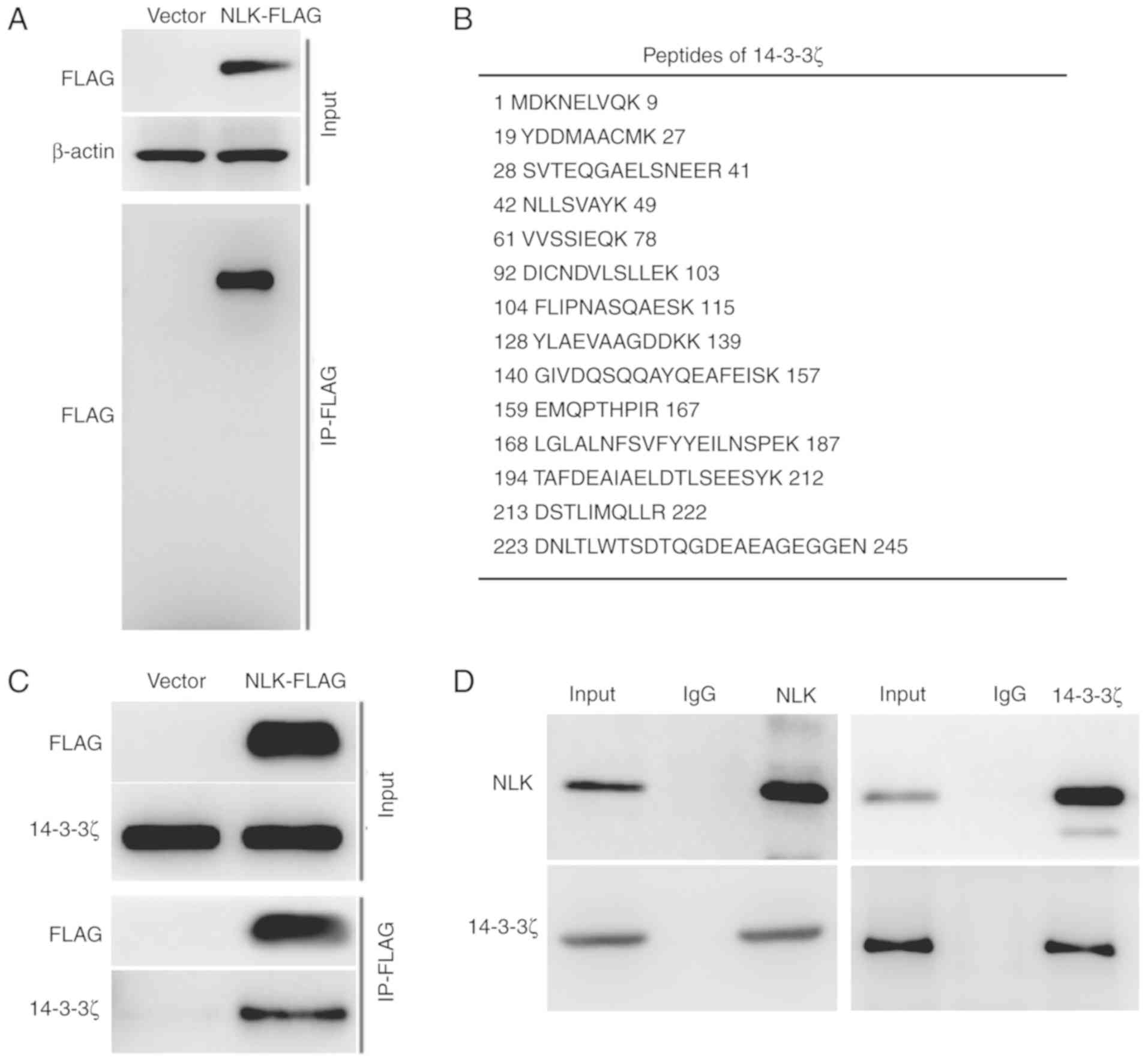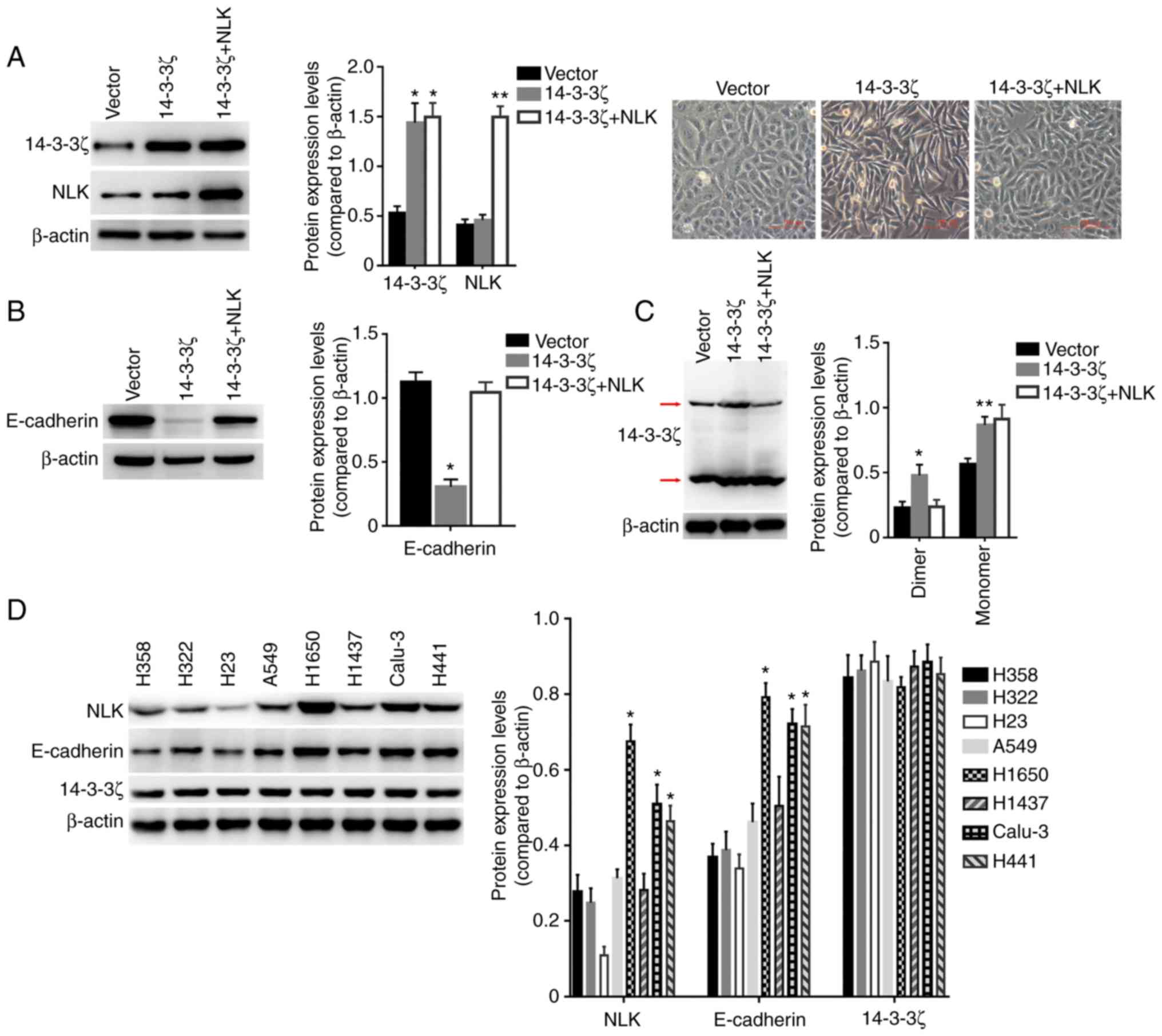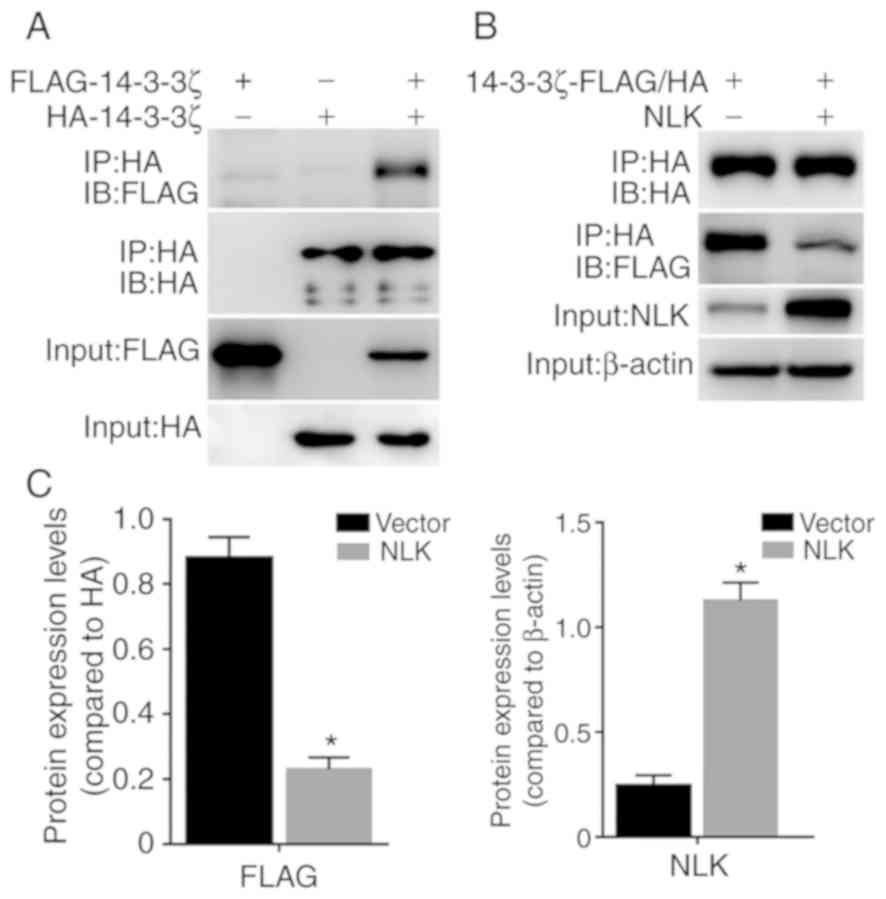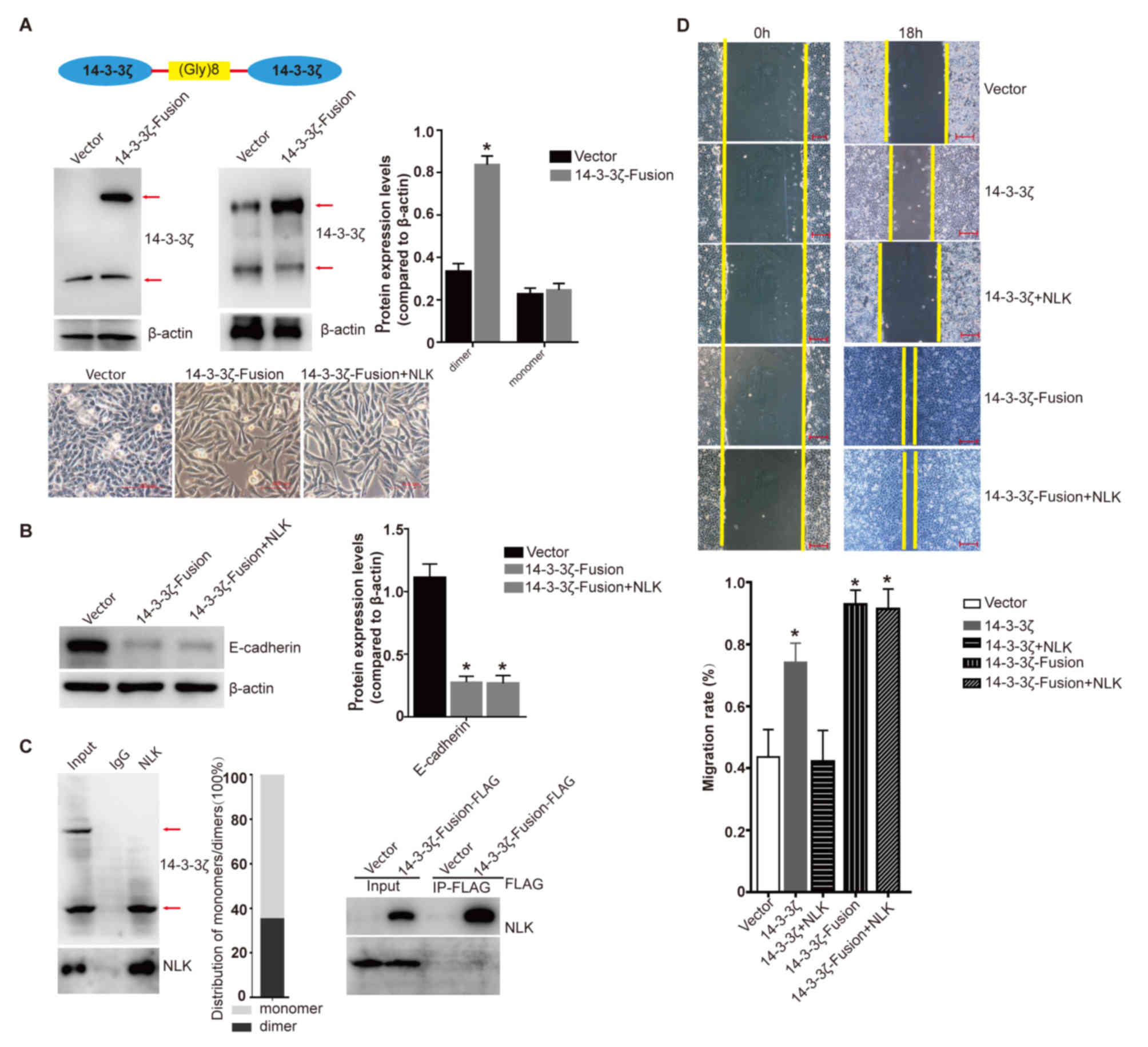|
1
|
Huang Y, Yang Y, He Y and Li J: The
emerging role of Nemo-like kinase (NLK) in the regulation of
cancers. Tumour Biol. 36:9147–9152. 2015. View Article : Google Scholar : PubMed/NCBI
|
|
2
|
Li SZ, Zhang HH, Liang JB, Song Y, Jin BX,
Xing NN, Fan GC, Du RL and Zhang XD: Nemo-like kinase (NLK)
negatively regulates NF-kappa B activity through disrupting the
interaction of TAK1 with IKKβ. Biochim Biophys Acta.
1843:1365–1372. 2014. View Article : Google Scholar : PubMed/NCBI
|
|
3
|
Yang Y, Zhe H, Massoumi R and Ke H:
Decreased expression of nemo-like kinase in melanoma is correlated
with increased vascularity and metastasis. Melanoma Res.
29:376–381. 2019. View Article : Google Scholar : PubMed/NCBI
|
|
4
|
Stevens KN, Kelemen LE, Wang X, Fridley
BL, Vierkant RA, Fredericksen Z, Armasu SM, Tsai YY, Berchuck A,
Narod SA, et al: Ovarian cancer association consortium: Common
variation in Nemo-like kinase is associated with risk of ovarian
cancer. Cancer Epidemiol Biomarkers Prev. 21:523–528. 2012.
View Article : Google Scholar : PubMed/NCBI
|
|
5
|
Zhang Y, Peng C, Wu G, Wang Y, Liu R, Yang
S, He S, He F, Yuan Q, Huang Y, et al: Expression of NLK and its
potential effect in ovarian cancer chemotherapy. Int J Gynecol
Cancer. 21:1380–1387. 2011. View Article : Google Scholar : PubMed/NCBI
|
|
6
|
Huang Y, Jiang Y, Lu W and Zhang Y:
Nemo-like kinase associated with proliferation and apoptosis by
c-Myb degradation in breast cancer. PLoS One. 8:e691482013.
View Article : Google Scholar : PubMed/NCBI
|
|
7
|
Lv L, Wan C, Chen B, Li M, Liu Y, Ni T,
Yang Y, Liu Y, Cong X, Mao G and Xue Q: Nemo-like kinase (NLK)
inhibits the progression of NSCLC via negatively modulating WNT
signaling pathway. J Cell Biochem. 115:81–92. 2014. View Article : Google Scholar : PubMed/NCBI
|
|
8
|
Sa JK, Yoon Y, Kim M, Kim Y, Cho HJ, Lee
JK, Kim GS, Han S, Kim WJ, Shin YJ, et al: In vivo RNAi screen
identifies NLK as a negative regulator of mesenchymal activity in
glioblastoma. Oncotarget. 6:20145–20159. 2015. View Article : Google Scholar : PubMed/NCBI
|
|
9
|
Campbell K, Rossi F, Adams J, Pitsidianaki
I, Barriga FM, Garcia-Gerique L, Batlle E, Casanova J and Casali A:
Collective cell migration and metastases induced by an
epithelial-to-mesenchymal transition in Drosophila intestinal
tumors. Nat Commun. 10:23112019. View Article : Google Scholar : PubMed/NCBI
|
|
10
|
Sjöberg E, Meyrath M, Milde L, Herrera M,
Lövrot J, Hägerstrand D, Frings O, Bartish M, Rolny C, Sonnhammer
E, et al: A novel ACKR2-dependent role of fibroblast-derived CXCL14
in epithelial-to-mesenchymal transition and metastasis of breast
cancer. Clin Cancer Res. 25:3702–3717. 2019. View Article : Google Scholar : PubMed/NCBI
|
|
11
|
Zhang J, Shao S, Han D, Xu Y, Jiao D, Wu
J, Yang F, Ge Y, Shi S, Li Y, et al: High mobility group box 1
promotes the epithelial-to-mesenchymal transition in prostate
cancer PC3 cells via the RAGE/NF-κB signaling pathway. Int J Oncol.
53:659–671. 2018.PubMed/NCBI
|
|
12
|
Dong C, Yuan T, Wu Y, Wang Y, Fan TW,
Miriyala S, Lin Y, Yao J, Shi J, Kang T, et al: Loss of FBP1 by
Snail-mediated repression provides metabolic advantages in
basal-like breast cancer. Cancer Cell. 23:316–331. 2013. View Article : Google Scholar : PubMed/NCBI
|
|
13
|
Qi M, Zhou Y, Liu J, Ou X, Li M, Long X,
Ye J and Yu G: AngII induces HepG2 cells to activate
epithelial-mesenchymal transition. Exp Ther Med. 16:3471–3477.
2018.PubMed/NCBI
|
|
14
|
Guo F, Gao Y, Sui G, Jiao D, Sun L, Fu Q
and Jin C: miR-375-3p/YWHAZ/β-catenin axis regulates migration,
invasion, EMT in gastric cancer cells. Clin Exp Pharmacol Physiol.
46:144–152. 2019. View Article : Google Scholar : PubMed/NCBI
|
|
15
|
Lu J, Guo H, Treekitkarnmongkol W, Li P,
Zhang J, Shi B, Ling C, Zhou X, Chen T, Chiao PJ, et al: 14-3-3zeta
Cooperates with ErbB2 to promote ductal carcinoma in situ
progression to invasive breast cancer by inducing
epithelial-mesenchymal transition. Cancer Cell. 16:195–207. 2009.
View Article : Google Scholar : PubMed/NCBI
|
|
16
|
Messaritou G, Grammenoudi S and Skoulakis
EM: Dimerization is essential for 14-3-3zeta stability and function
in vivo. J Biol Chem. 285:1692–1700. 2010. View Article : Google Scholar : PubMed/NCBI
|
|
17
|
Tzivion G, Luo Z and Avruch J: A dimeric
14-3-3 protein is an essential cofactor for Raf kinase activity.
Nature. 394:88–92. 1998. View
Article : Google Scholar : PubMed/NCBI
|
|
18
|
Reddy Chichili VP, Kumar V and Sivaraman
J: Linkers in the structural biology of protein-protein
interactions. Protein Sci. 22:153–167. 2013. View Article : Google Scholar : PubMed/NCBI
|
|
19
|
Mishra R, Gorlov IP, Chao LY, Singh S and
Saunders GF: PAX6, paired domain influences sequence recognition by
the homeodomain. J Biol Chem. 277:49488–49494. 2002. View Article : Google Scholar : PubMed/NCBI
|
|
20
|
Wilson KA, Bär S, Maerz AL, Alizon M and
Poumbourios P: The conserved glycine-rich segment linking the
N-terminal fusion peptide to the coiled coil of human T-cell
leukemia virus type 1 transmembrane glycoprotein gp21 is a
determinant of membrane fusion function. J Virol. 79:4533–4539.
2005. View Article : Google Scholar : PubMed/NCBI
|
|
21
|
Nagi AD and Regan L: An inverse
correlation between loop length and stability in a
four-helix-bundle protein. Fold Des. 2:67–75. 1997. View Article : Google Scholar : PubMed/NCBI
|
|
22
|
Kuusinen A, Arvola M and Keinänen K:
Molecular dissection of the agonist binding site of an AMPA
receptor. EMBO J. 14:6327–6332. 1995. View Article : Google Scholar : PubMed/NCBI
|
|
23
|
Wang W, Prosise WW, Chen J, Taremi SS, Le
HV, Madison V, Cui X, Thomas A, Cheng KC and Lesburg CA:
Construction and characterization of a fully active PXR/SRC-1
tethered protein with increased stability. Protein Eng Des Sel.
21:425–433. 2008. View Article : Google Scholar : PubMed/NCBI
|
|
24
|
Mir N, Jayachandran A, Dhungel B, Shrestha
R and Steel JC: Epithelial-to-mesenchymal transition: A mediator of
sorafenib resistance in advanced hepatocellular carcinoma. Curr
Cancer Drug Targets. 17:698–706. 2017. View Article : Google Scholar : PubMed/NCBI
|
|
25
|
Ahn HM, Yoo JW, Lee S, Lee HJ, Lee HS and
Lee DS: Peroxiredoxin 5 promotes the epithelial-mesenchymal
transition in colon cancer. Biochem Biophys Res Commun.
487:580–586. 2017. View Article : Google Scholar : PubMed/NCBI
|
|
26
|
Castro NP, Rangel MC, Merchant AS,
MacKinnon G, Cuttitta F, Salomon DS and Kim YS: Sulforaphane
suppresses the growth of triple-negative breast cancer stem-like
cells in vitro and in vivo. Cancer Prev Res (Phila). 12:147–158.
2019. View Article : Google Scholar : PubMed/NCBI
|



















